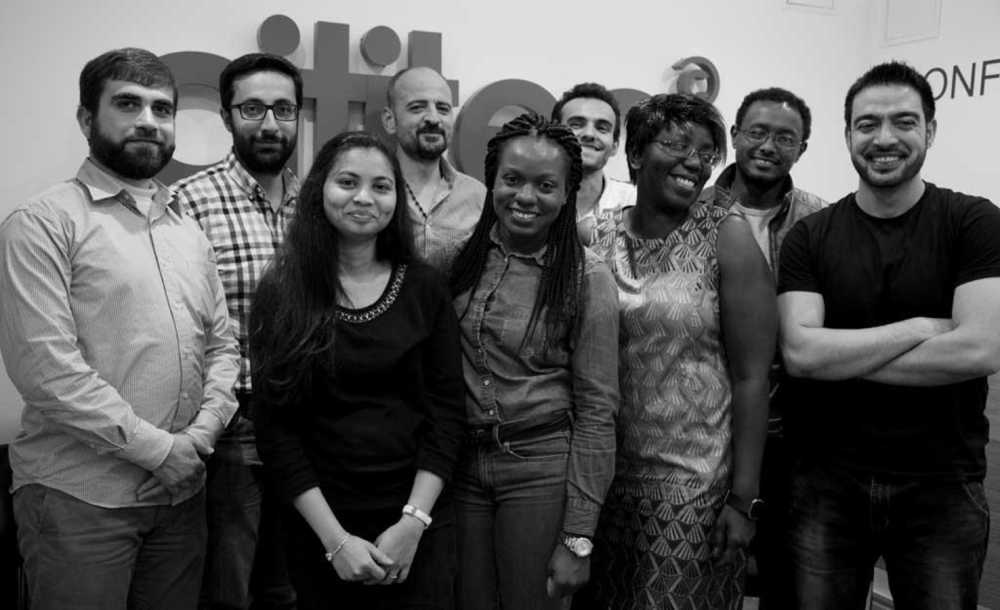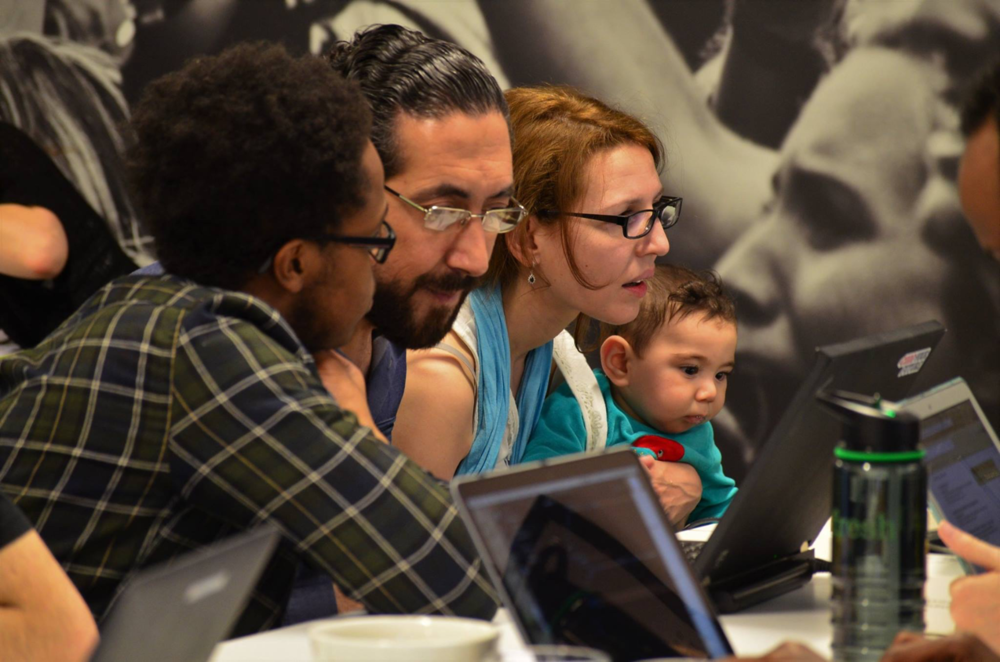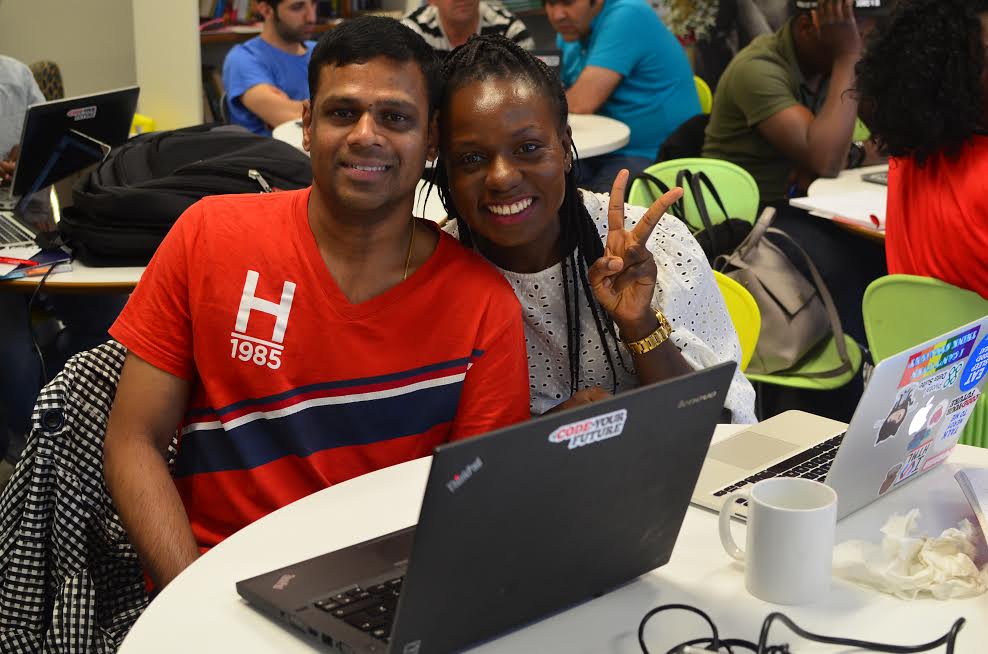Coding without borders – how CYF empowers refugees
Earlier this year, our Social Value task force donated a number of laptops to
Earlier this year, our Social Value task force donated a number of laptops to Code Your Future, a non-profit organisation set up to help refugees become developers. After speaking at our most recent company meeting, we invited founder Germán Bencci to share how far Code Your Future has come - and what he still hopes to achieve - in this guest blog.
Why we started
While working in the tech industry, I used to ask myself how technology and innovation could create a positive and tangible impact to people in need. You may have asked yourself a similar question and a reason why you might be reading this. I found the answer in education and collaboration.
Last year a small group of professional developers got together with a group of asylum seekers and refugees to start the first class of CodeYourFuture, UK’s coding school for refugees. In that first class, we had people from Syria, Afghanistan, Uganda, Ethiopia, India and a stateless person. We didn’t know them and they didn’t know us. Actually, the developers barely knew each other – we had only met a couple of times before in order to prepare that very first class. It was a leap into the darkness and our only flashlight was the precursor work of a coding school in Netherlands, HackYourFuture, which was already showing some great results by teaching refugee students during the weekends. They were a source of inspiration and guidance to start this project; there were many intrinsic challenges to start in a new country, but the needs in the UK were clear.

There are over 117,000 refugees in the UK and more than 15,000 applicants are granted asylum every year. They have fled extremely difficult circumstances in their home countries, but after arriving in a safe place they find themselves with little or no opportunities to gain a skilled employment, even if they have years of experience and a University degree from their home country. One thing that I have learned from my experience with refugees is that paradoxically the difficulties of assimilating and becoming part of society for some are nearly as tough as fleeing persecution and making a dangerous trip across several continents. A refugee once told me: “when we were in Calais, we had one aim – to get to the UK, to get to safety. We were together, all in a similar situation and we knew what needed to be done. But now it’s different. I feel lost“ After arriving in the UK many refugees find themselves spread out far and wide across the country, they lose touch with the few people they know and become completely overwhelmed by bureaucracy. Many get stuck in minimum wage jobs, even despite qualifications and previous experience they have.
Refugees often have little understanding of how the UK labour market works and their abilities might need to be updated to local demands. The training prospects are few and they face the vicious circle of living under benefits and with few opportunities to gain meaningful job experience to become employable. The more time passes, the less likely a person without work is able to find one. As forced migrants, refugees live under the threat of such reality. What if we could find refugees interested in technology and give them a chance to become a coder?
What we’ve done
At CodeYourFuture we aim to provide opportunities to learn new skills and training for refugees. Last year as we received applications, we had to evaluate their commitment. We requested them to complete a series of introductory online tasks to prove their motivation and dedication to studying. The first student applied two months before that first class started, the last one only four days before. We were doing this, while at the same time reaching out to developers that were interested in becoming the students’ mentors and guiding them in their learning process. We had nothing but a dream of creating a real change in people’s lives at the core of the tech movement.

We have faced a number of challenges. For example, a couple of weeks before the start date of the programme we still didn’t have a place that could host our classes. We wanted to do them on the weekend so that it could be easier for refugees and mentors to attend and spend a whole day together, but the weekends made it harder for companies to arrange it. Finally, a friend of a friend of a friend, the chairman of Cititec, a recruitment agency, stepped forward and said that he loved the idea and offered us their offices. We had students, mentors, and a roof. We didn’t have any funding –and we still don’t–, but had some of the most essential resources: people, experience, and kindness. That was the beginning of a community and will remain the core of our organisation.
On the one hand, we have a group of people that have escaped persecution and danger, fled their home countries, leaving behind jobs, studies and relatives. They arrived here in the hope of remaking their lives, finding new jobs and new friends. For some, learning web development has long been a long unfulfilled dream, and for others, an opportunity for a fresh start. On the other hand we have a group of professional developers, who might have learnt coding through University, a bootcamp or self-taught. They work for great companies during the week, but have the desire to positively influence the lives of other people in need. Their selfless support in sharing their time and abilities to guide our students through numerous web technologies is at the core of our community. By creating an environment that is open, playful and tolerant, we create the grounds for a lasting learning experience. One that can change their lives forever, at both the technical and personal level.

One of the most incredible things about people that live under tough circumstances is how much they are committed to give back as soon as they have established themselves. Their experience and circumstances provide them with a unique perspective to design and develop services to help others that were under similar difficulties. As an example, one of the final projects for our first cohort, our students developed prototypes for a directory of services of NGO organisations that will evolve into a full-project to be used by the charities that helped many of our students when they arrived in the country.
Where we’re heading
Our coding school is working towards imparting the most popular web technologies, but our end goal is clear. We train refugees to get them into full-time employment. Learning and training is an enriching experience, but when you arrive into a new country, have a family to feed and want to improve your conditions, obtaining a full-time skilled employment is still the most impactful way to achieve it. And to be able to get there, we need to consider the other side of the equation.
It is not just refugees themselves that may benefit from projects like ours. A key beneficiary in the empowerment of refugees are the companies that will hire them. Our group of students represents the most diverse group of people that can be found in the tech industry. They consist of underprivileged minorities across all cultures, religions, nationalities and LGBT, all an intrinsic part their refugee status.
This provides a unique opportunity for employers, that by offering them their first professional experience they can:
(a) Improve the diversity and minority representation among their workforce. According to a worldwide survey from Stackoverflow over 74% of the software developers are white or of European descent. As refugees, our classes come from ‘the rest of the world’.
(b) Provide the stage to lift people out of receiving benefits from the state into contributors of society. Most companies acknowledge the power of providing tools to be self-sufficient and independent, and not simply offer short-term solutions. Organisations recruiting new employees have an opportunity to become the setting that offers them the first port in the students’ careers and therefore becoming a fundamental part in changing peoples’ lives.
(c) Enrich the perspective of the workforce thanks to the unique experience of our graduates. Employers that aim for a work force that thinks differently and has different points of view will be more resilient and prepared to adapt to any audience, culture and language.
CodeYourFuture is on a constant iteration process to create the ideal training programme to craft employable individuals. It can also be seen as a tool to improve people’s lives, but also companies’ impact in society. It is only through an accumulative effect of giving and sharing that these goals will be achieved. Luckily, a few companies are taking the lead:
(a) Red Badger was the first company that offered us their older laptops to our first group of students so that we could proceed to a much-needed upgrade of their most essential learning tool. We are now discussing further ways of collaboration.
(b) Ticketmaster committed for 6-months to support our second group of students by offering their spacious and comfortable office on the weekends and also donate several laptops at the beginning of our second class.
(c) WeGotPop offered paid developer positions to two of our graduate students, becoming the first company in the UK to offer our graduates the opportunity to grow into junior web developers.
We have the vision to transform the lives of many underprivileged people in society. Within it, there is a role to play in the tech ecosystem, from individual expertise to donations to sponsorship to job openings. Together we can create an end-to-end solution that offers opportunities, creates lasting change and diversifies companies. A service that empowers individuals and brings a virtuous circle of impact in society.
CodeYourFuture offers a 6-months web development training programme for asylum seekers and refugees. They started in October 2016 and their first cohort graduated in April 2017. They are now running classes in London and Glasgow, with plans to open in other cities in the UK. If you think you could help Code Your Future with any type of donation please get in touch with CYF here: contact@codeyourfuture.co or let us know and we’ll be happy to make an introduction.